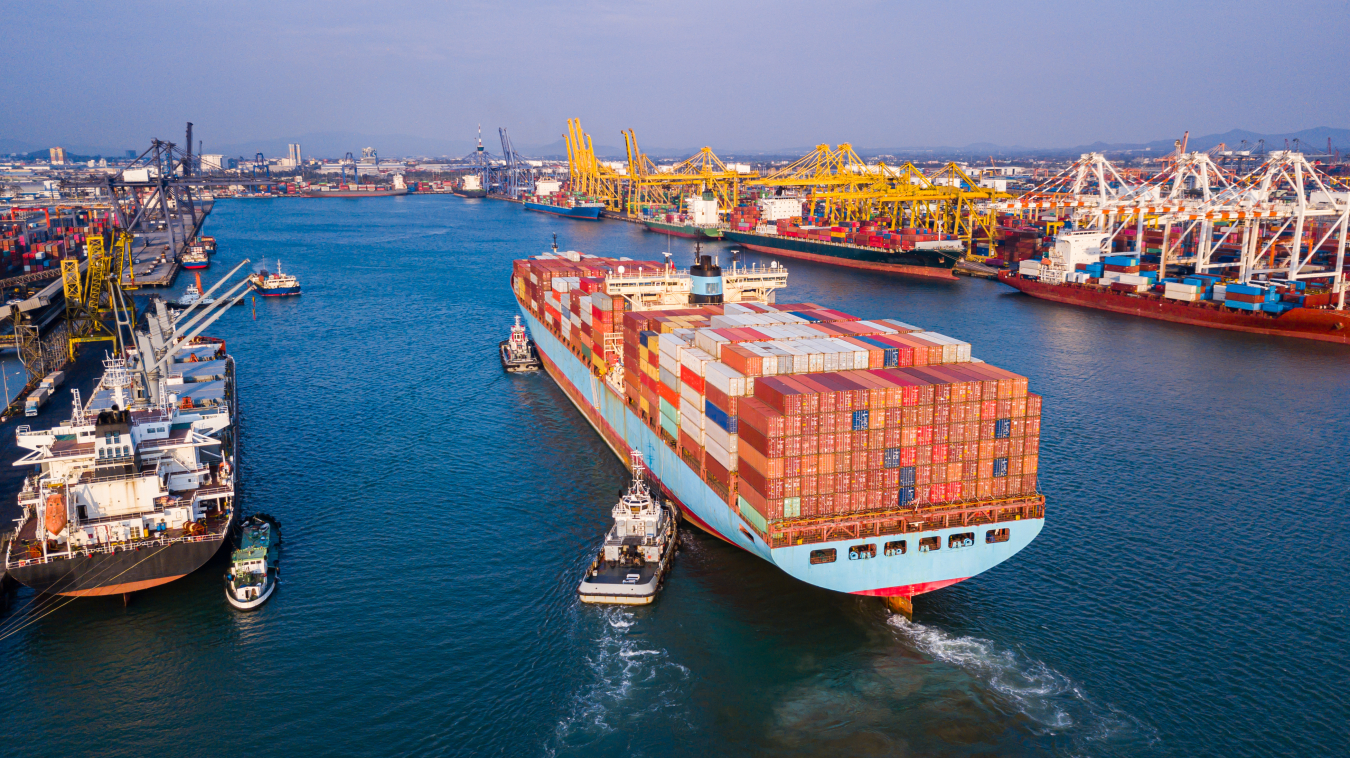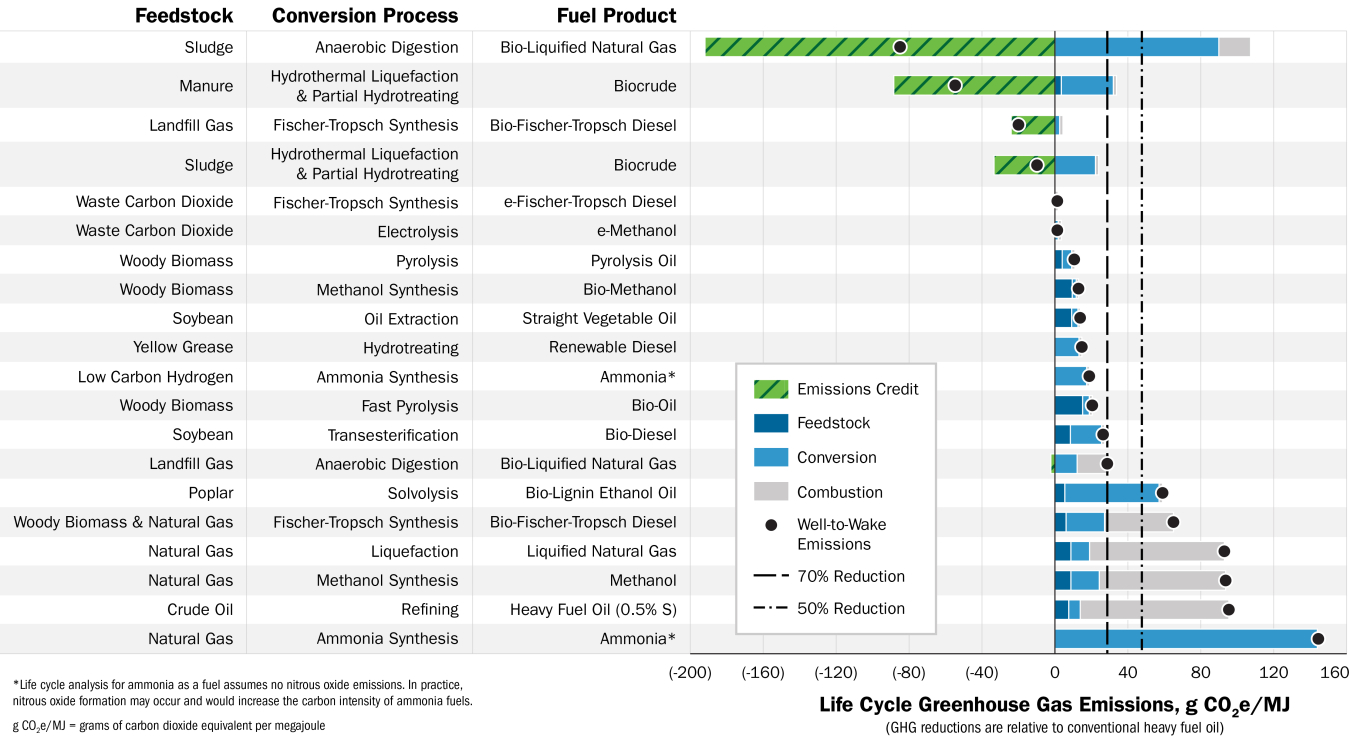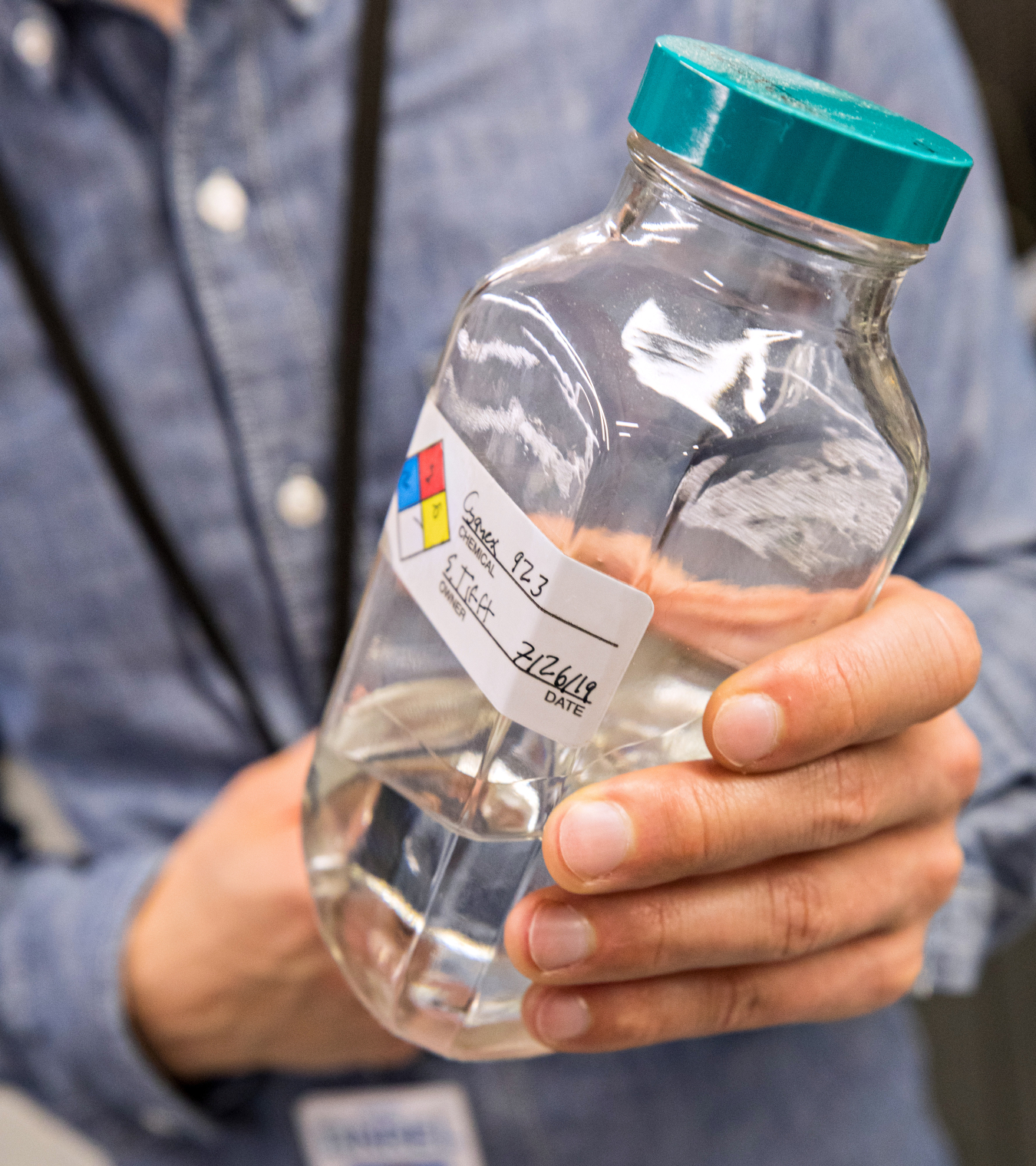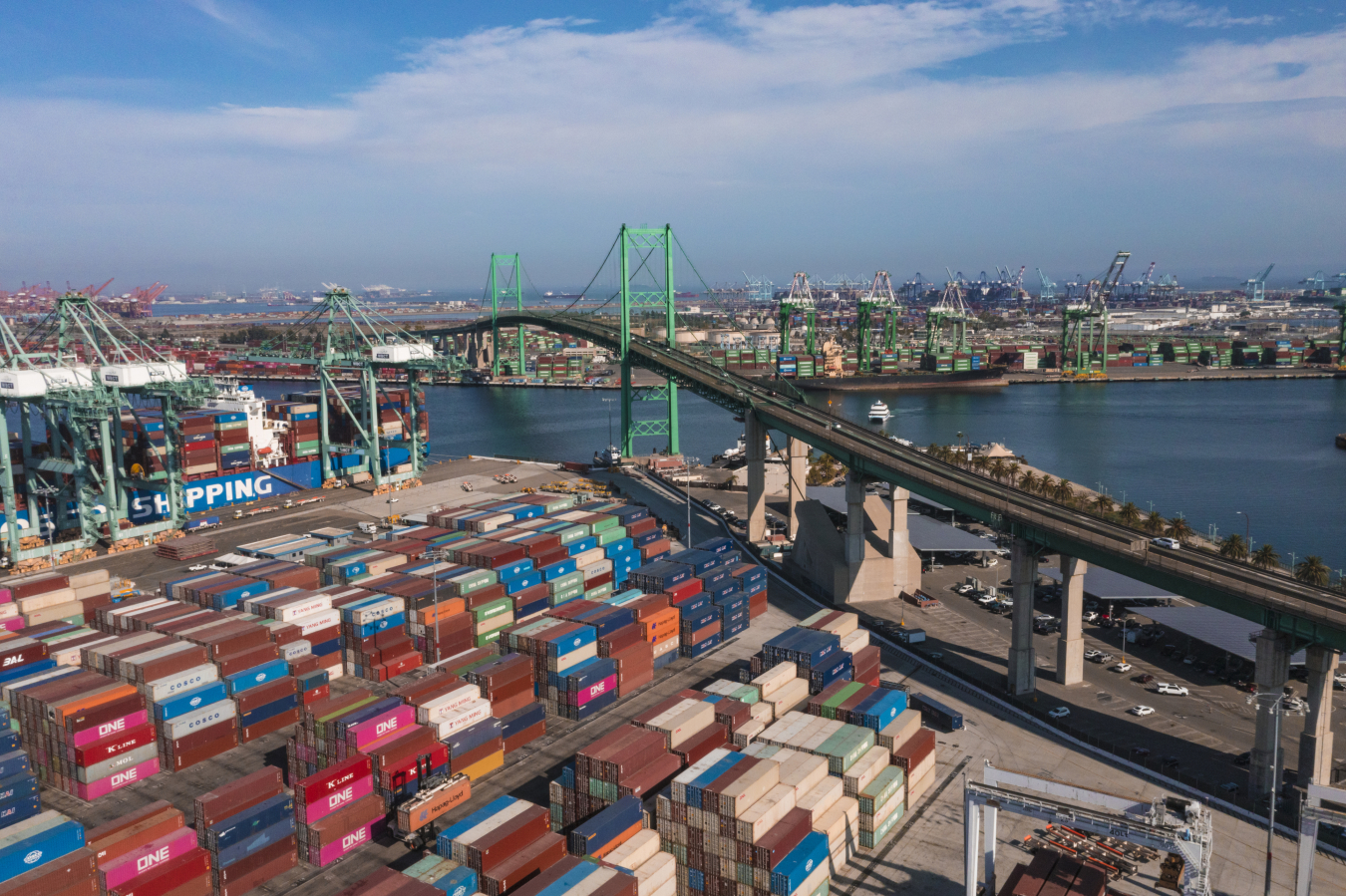DOE and the American Shipping Bureau are collaborating to lower the emissions of the maritime shipping industry after signing a new memorandum of understanding! Learn more
The U.S. Department of Energy (DOE) Bioenergy Technologies Office (BETO) funding in research, development, and demonstration of low- and net-zero-carbon marine biofuels to help lower emissions in maritime transport.
International maritime transport accounts for approximately 3% of global carbon dioxide emissions, this includes a wide variety of vessels, from small recreational boats to massive, ocean-going container ships. Although smaller marine vessels may be powered by batteries or hydrogen fuel cells, many larger vessels need energy-dense fuels to support global voyages.
With a far lower carbon footprint than petroleum-based fuels, marine biofuels are critical for lowering emissions, and promoting energy security in the maritime sector.

The maritime sector accounts for 3% of global carbon dioxide emissions, primarily through the combustion of heavy fuel oil to power massive container ships. With a far lower carbon footprint than petroleum-based fuels, marine biofuels are critical for lowering the emissions of the movement of goods across oceans. Photo courtesy of iStock.
Partnerships
Supported by capabilities and expertise from DOE national laboratories, BETO works across DOE offices and other federal agencies for a strategic approach for building a robust and stable economy for production and use of marine biofuels. DOE spearheads the interagency development of the U.S. Maritime Action Plan and funds research and development to reduce maritime transportation sector emissions.
Industry and stakeholder engagement is essential to continuing U.S. leadership. To propel this work, DOE’s Office of Energy, Efficiency & Renewable Energy (EERE) has a Memorandum of Understanding with the American Bureau of Shipping (ABS) to further energy development for the maritime industry. ABS is a non-profit marine classification, standards/certification, and research organization. The organization serves as a hub of independent maritime knowledge and technical authority for both industry and government agencies and supports owners and operators of maritime vessels and other assets with specialized expertise across a vessel or asset’s full lifecycle. This relationship facilitates open engagement, information sharing, and collaborative research on U.S. maritime transportation strategies in the following areas:
- U.S. Delegation to the Zero-Emission Shipping Mission
- U.S. Maritime Action Plan
- Analysis for Low Carbon Intensity Energy in the Maritime Shipping Domain
- Analysis for Low Emission Fuels/Electrification Implementation for Vessels and Port Operations
DOE is a member of Mission Innovation, an initiative of 22 countries and the European Commission to accelerate progress toward lowering emissions. As a co-lead for the initiative’s Zero-Emission Shipping Mission, DOE coordinates international efforts with other countries, private industry, research organizations, and communities to set international shipping on a trajectory to reduce emissions.
Outside of Mission Innovation, DOE, in collaboration with the U.S. State Department and the Mærsk Mc-Kinney Møller Center for Zero Carbon Shipping, is leading the Green Shipping Corridor Initiation Project including partnerships with Panama, Namibia, and The Pacific Blue Shipping Partnership.
Marine Biofuels Lower Emissions
More than 90% of global goods are carried by cargo ships, and many of these ships are powered by heavy fuel oil (HFO), a residual fuel produced from petroleum refining which emits relatively large amounts of emissions when combusted. Marine biofuels are a recognized pathway for lowering emissions compared to HFO and other petroleum-based marine fuels.

Many emerging marine biofuels enable a greater than 70% reduction in well-to-wake emissions, depending on the exact feedstock and conversion process. Data courtesy of Argonne National Laboratory.
Marine biofuels are produced using a variety of materials, methods, and technologies that convert domestic fuel resources—called “feedstocks”—into energy-dense fuels with the correct properties and characteristics to be safely used in marine engines.
These feedstock types include:
- Forestry and agricultural wastes
- Non-food energy crops like switchgrass and miscanthus
- Waste oils, fats, and greases
- Manure, sewage sludge, and other wet wastes
- Landfill gas
- Algae biomass
- Municipal solid waste.
To maximize the emission advantage, BETO research focuses on near-term and emerging marine biofuels with the potential for negative or near-negative life cycle emissions.

DOE national laboratories are actively developing drop-in biofuels that support reductions in emissions compared to petroleum-based fuels. Figure courtesy of Werner Slocum, National Renewable Energy Laboratory.
Drop-In Fuels
Drop-in marine biofuels can be used in existing infrastructure and marine engines without major modifications. As a result, marine vessels may begin using these fuels in as little as a few years to support immediate reductions in emissions. Examples include:
- Renewable diesel
- Biodiesel
- Hydrotreated vegetable oil
- Bio-oil
- Bio-crude.
Emerging Marine Fuels
The maritime industry is also pursuing emerging marine biofuels with the potential for low emissions, including:
- Bio-methanol
- Lignin-alcohol mixes
- Bio-based natural gas.
These emerging marine biofuels offer flexibility and some performance advantages but may require new engine designs and other mechanical modifications. Some global shipping companies have already announced plans to use these fuels in the coming years.
A Pathway for Improving Air Quality in Port Communities

Marine biofuels can improve air quality around the nation’s largest seaports, including the Port of Los Angeles pictured here. Photo courtesy of iStock.
HFO and other petroleum-based marine fuels often contain relatively high levels of sulfur, which is emitted as sulfur oxide during combustion. This, along with other toxic air pollutants created during combustion, contributes to poor air quality for the millions of people that live close to seaports.
Marine biofuels are a reliable solution for improving air quality in port communities without the need to add costly emissions controls to marine engines. Naturally low in sulfur, marine biofuels produce lower levels of air pollutants, including:
- Sulfur oxide
- Nitrogen oxides
- Particle pollution.
As a result, the maritime industry is better equipped to meet increasingly stringent air quality regulations set by the International Maritime Organization.
Strategic Research Lowers the Risk of Adoption
According to BETO’s 2016 Billion Ton Report, the United States has enough feedstocks to produce millions of gallons of biofuels every year. Every year, the global maritime industry consumes an estimated 105 billion gallons of fuel, which is expected to double by 2030 as global trade expands. To increase production of marine biofuels to meet this demand, the industry needs reliable analyses and data to:
- Understand regulatory requirements
- Scope biofuel performance
- Address challenges to large-scale commercialization.
BETO supports research designed to guide funding in demonstration of marine biofuels. This includes a whole-system approach to ensure the maritime sector can reap the advantages of marine biofuels without shouldering significant risks:
- Analyses to understand costs, emissions, and resource constraints, as well as environmental implications
- Combustion/engine testing to understand how marine biofuels interact with current and future marine vessels
- Fuel property and consumption assessments to ensure new fuels meet quality standards
- Pilot-scale demonstrations of promising production technologies, such as hydrothermal liquefaction and pyrolysis, to lower the risk of commercial production at refineries across the country.
Learn more about BETO-supported biofuel process development units at Pacific Northwest National Laboratory and the National Renewable Energy Laboratory.
Related Marine Biofuels Resources
- EERE ABS Memorandum of Understanding
- U.S. Department of Energy Leads International and Domestic Efforts for Net-Zero Emissions Shipping by 2050
- Webinar: Current State of Marine Biofuels
- Bioenergy KDF Marine Biofuels
- Mission Innovation Shipping
- U.S. Department of Transportation Maritime Environmental and Technical Assistance Program

